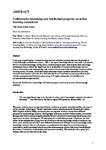Collaborative knowledge and intellectual property: an action learning conundrum
| dc.contributor.author | Elliott, T | en |
| dc.contributor.author | Pedler, M | en |
| dc.date.accessioned | 2018-02-20T09:44:33Z | |
| dc.identifier.issn | 1476-7333 | en |
| dc.identifier.uri | http://hdl.handle.net/10026.1/10823 | |
| dc.description.abstract |
© 2017 Informa UK Limited, trading as Taylor & Francis Group If everyone is contributing, if action learning involves collective learning, then new knowledge is created through a collaborative process. This is not expert knowledge and no ‘one truth’ is produced, this is a collective knowledge arising from a common purpose and a shared quest. Such knowledge continues to evolve without the intention to fix or commodify. Collaborative knowledge can be a source of innovation and sustainability, and as such a key process in the knowledge economy and the learning society. However, whilst knowledge economies require constant innovation to promote economic development and trade, this often takes the form of intellectual property production (IP), with the consequent establishment and policing of IP rights, notions that are antithetical to collaborative knowledge creation. | en |
| dc.format.extent | 1 - 10 | en |
| dc.language.iso | en | en |
| dc.publisher | Taylor & Francis (Routledge) | en |
| dc.title | Collaborative knowledge and intellectual property: an action learning conundrum | en |
| dc.type | Journal Article | |
| plymouth.issue | 1 | en |
| plymouth.volume | 15 | en |
| plymouth.publication-status | Accepted | en |
| plymouth.journal | Action Learning: Research and Practice | en |
| dc.identifier.doi | 10.1080/14767333.2017.1363717 | en |
| plymouth.organisational-group | /Plymouth | |
| dcterms.dateAccepted | 2017-06-02 | en |
| dc.rights.embargodate | 2019-04-10 | en |
| dc.identifier.eissn | 1476-7341 | en |
| dc.rights.embargoperiod | Not known | en |
| rioxxterms.versionofrecord | 10.1080/14767333.2017.1363717 | en |
| rioxxterms.licenseref.uri | http://www.rioxx.net/licenses/all-rights-reserved | en |
| rioxxterms.type | Journal Article/Review | en |


